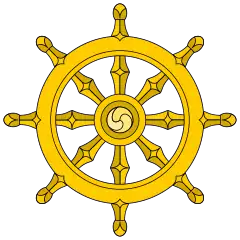Suppabuddha
Suprabuddha (Sanskrit), or Suppabuddha (Pali) was the uncle and father-in-law of the Buddha according to the Mahavamsa genealogy and the Theravada commentarial tradition.[1] He was also known as Mahāsuppabuddha.
| Suppabuddha | |
|---|---|
| Siblings | Maya Mahapajapati Gotami |
| Spouse | Amitā |
| Issue | Bhaddakaccānā, DevadattaYasodhara |
| Father | Añjana |
| Mother | Yasodhara |
| Part of a series on |
| Buddhism |
|---|
 |
|
Suppabuddha is also the name of several other individuals mentioned briefly in the Theravada tradition.
Sources
According to the Mahavamsa, he was the son of king Añjana and his wife Yasodharā.[1] He was the father of both Bhaddakaccānā (Siddhartha's wife Yasodharā) and Devadatta, the Buddha's rival, from his wife Amitā. He had two sisters, Māyā and Pajāpatī and a brother, Dandapāni. As the mother of Buddha was Maya, that made him the uncle of the Buddha, and as his daughter was the wife of the Buddha, he became also the father-in-law to the Buddha.[1]
Western scholars note that the pattern of cross-cousin marriage described in the Mahavamsa genealogy is typical of historical marriage practices in Dravidian societies in Southern India, but not typically associated with Northeast India and the Ganges Basin of the historical Buddha.[2] Thus, the genealogy ascribed to the Buddha by the Mahavamsa may reflect elaboration and interpretation that reflects local traditions rather than historical fact.[2]
According to the Mahāyāna Abhiniṣkramaṇa Sūtra (佛本行集經), Suprabuddha was a wealthy Shākyan who lived in Devadaha. He had eight daughters, the eldest of whom was Māyā and the youngest, Mahāpajāpatī. Both of them married King Shuddhodana. The other six daughters married his three brothers, two sisters to each.
Life
According to the Theravada commentaries, the king was very offended because Prince Siddhartha had left his daughter Yasodhara to renounce the world and because his son Devadatta had come to regard him as his arch enemy.[1] One day, knowing that the Buddha would be coming for almsfood, he got himself drunk and blocked the way. When the Buddha and the bhikkhus came, Suppabuddha refused to make way. Finding the road blocked, the Buddha and the bhikkhus turned back, and the Buddha remarked to Ananda that the king would be swallowed by the earth for being disrespectful towards a Buddha.[1]
Informed of this prediction, the king sealed himself up on a high floor of his palace as a precaution. However, on the seventh day predicted by the Buddha, a horse belonging to the king broke loose and the king went to attempt to calm it. He fell down the stairs and was swallowed by the earth, sharing the same eventual fate as his son, Devadatta.[1]
Others Named Suppabuddha
Suppabuddha the Sakyan is one of several individuals by that given name identified in Pali literature. Others include:
- Suppabuddha the Leper, a man born as a leper as punishment for having disparaged a Pratyekabuddha, who became a sotāpanna after hearing Shakyamuni Buddha preach in Rājagaha. He appears in the Udana and his story appears in two different variations, one including the intervention of the god Sakka, in the Udana and Dhammapada commentaries.[1]
- Suppabuddha, son of Vessabhū Buddha in his last lay life.[1]
- An ancient king called Suppabuddha was a former birth of Eraka Thera, a monk mentioned in the Theragatha.[1]
References
- Dictionary of Pali Proper Names
- Kemper, Steven (1992). The Presence of the Past: Chronicles, Politics, and Culture in Sinhala Life (1st ed.). Ithaca, NY: Cornell University Press. pp. 48–9. ISBN 0801423953.
